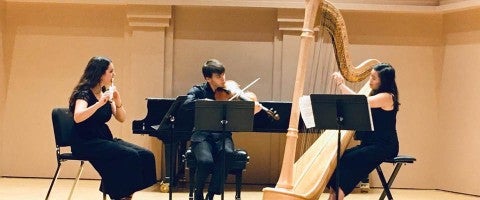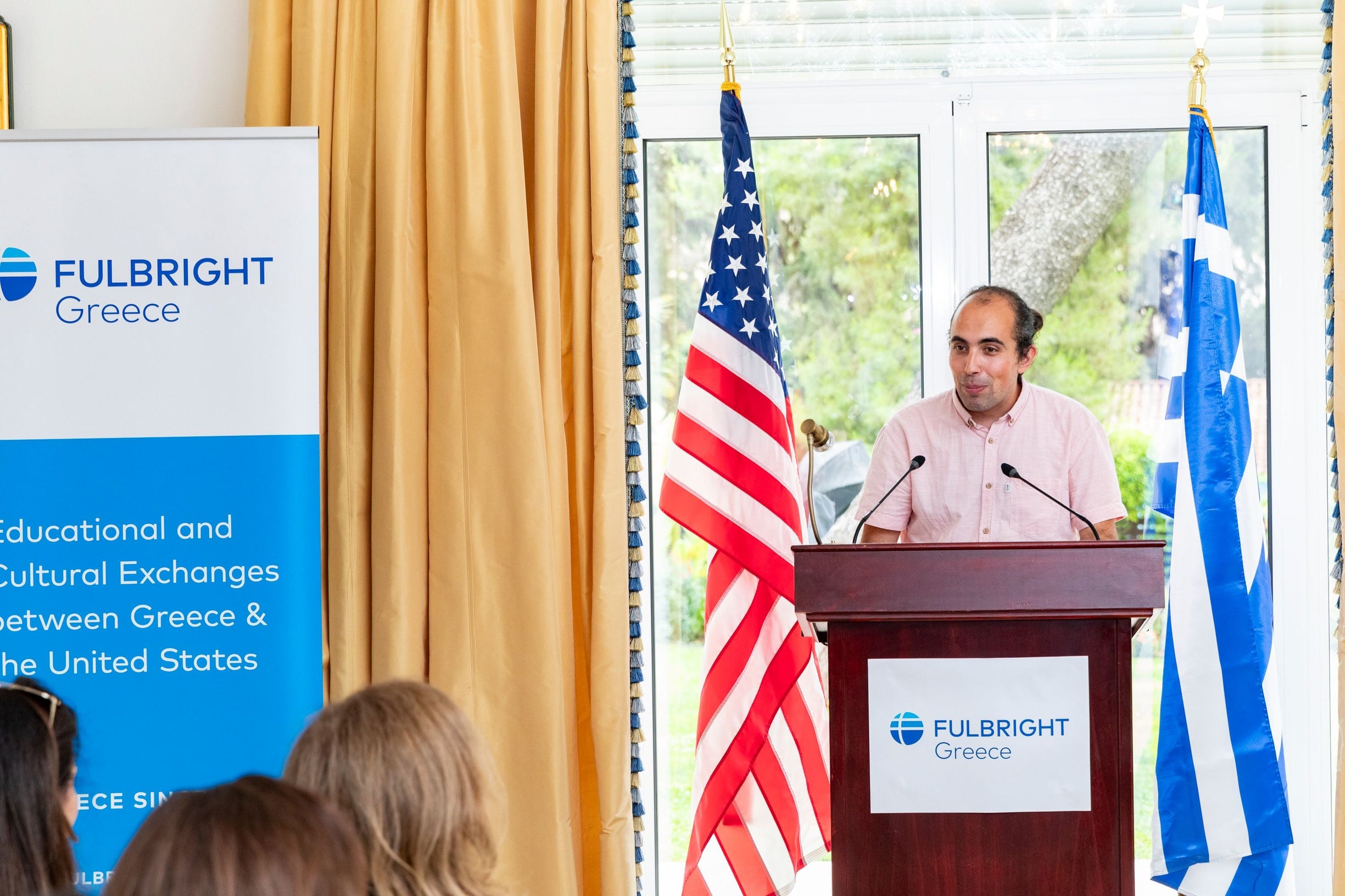2023-2024 Fulbright Scholar Andreas Vavvos was invited to speak at the annual Fulbright Greece award ceremony for new grantees. Below, read Andreas' speech and more about him and his Fulbright journey!
Gardeners and the little Mozart
I was born and raised in a lower middle-class household in Kozani, Western Macedonia, where my parents owned a refrigerator repair business. At eighteen, driven by a desire to “help people” and a sincere curiosity about human nature, I decided to pursue a degree in psychology. I moved to Crete to study psychology in 2011, when, unfortunately, my parents' business was shut down and the family was left in a precarious position. To become financially independent, I subsequently made the decision to work as a football referee while I was a student. I also started working on university research projects. Due to financial constraints, I was fortunate enough to receive free housing and meals at the university. During my time in Texas this year as an IKY-Fulbright scholar, I frequently complimented the Greek state for offering students this invaluable help and support.
So, psychology in Crete. Even though I enjoyed studying psychology, I soon concluded that it focused too much on individuals and switched to sociology, only to discover that sociology likewise focused too much on society. After that, I turned to anthropology, where I am currently pursuing my doctorate. Being from Western Macedonia, the energy hub of the country, I wanted to study a subject that would be important to my community: I decided to concentrate my research on the reasons why people oppose the current energy transition. It was at this point that I had my Fulbright experience in Houston, Texas, which ended up being my first journey outside of Europe. I still remember Dr. Sofia Triliva, my supervisor and a former Fulbright grantee, advising me, when I entered her office "I understand you may not get the grant, but you should consider applying for this scholarship," Later, Dr. Daniel Knight, my other supervisor, chimed in: "Why not Rice University in Houston? It is the obvious choice for you." So, I worked at the Centre for Environmental Studies at Rice University where I gained valuable cross-disciplinary skills, I studied and collaborated with knowledgeable graduate students and professors, and I experienced the Southern hospitality in all its forms. But as an energy researcher, nothing will be more memorable than the chance to live in Houston: the energy capital of the world.
I can only express my accolades and gratitude to IKY and the Fulbright Foundation for providing funding to social science researchers, and I feel privileged to have received this opportunity. In an era where funding for the social sciences is becoming increasingly scarce, this is a praiseworthy decision. As energy researchers, we are aware that while technical expertise is crucial in addressing climate change, it is insufficient on its own. We desperately need sociological, psychological, anthropological and interdisciplinary tools to critically examine the social and political context in which these technological advancements are being implemented. This is not only crucial for researchers. It is crucial for the sustainability dilemmas that our planet is confronting.
And I would like to close this speech with one of my favorite excerpts from Wind, Sand and Stars, a memoir by Antoine de Saint-Exupéry. While riding the train, he caught sight of a cute little kid in the arms of his Polish parents, who were workmen and seemed to have endured hardships due to poverty. Staring at the kid, Exupéry says:
This is a musician's face. This is the child Mozart. This is a life full of beautiful promise. When by mutation a new rose is born in a garden, all the gardeners rejoice. They isolate the rose, tend it, foster it. But there is no gardener for men. This little Mozart will be shaped like the rest by the common stamping machine. This little Mozart will love shoddy music in the stench of night dives. This little Mozart is condemned (...) And it was by no means charity that tormented me (...) What tormented me was the perspective of the gardener. (...) In every man, in a way, there is an assassinated Mozart.
With this, I would like to thank my own gardeners, my parents, my supervisors, the Greek state, IKY and the Fulbright Foundation, who supported my journey in academia.
About Andreas:
Andreas Vavvos was one of the five recipients of the State Scholarship Foundation (IKY) and Fulbright Greece scholarship during the academic year 2023-2024. As a PhD candidate in the Department of Psychology at the Faculty of Social Sciences, University of Crete and the Department of Social Anthropology at the University of Saint Andrews (Scotland), he spent six months at Rice University, Houston, Texas, and specifically at the Center for Environmental Studies, one of the world's best interdisciplinary research centers on environmental issues.
The anthropology of energy is his main area of research, with a specialization in energy transitions. In this context, he conducts anthropological field research in Greece, with the primary objective of causally explaining the phenomenon of opposition to energy transition in Western Macedonia and Crete.
Mr. Vavvos' mentor for the time he was at Rice University was Professor Cymene Howe.
Mr. Vavvos plans to go to Norway next year, probably through the Erasmus+ program of the University of Crete.
In the context of the Fulbright scholarship award ceremony (academic year 2024-2025), which took place on 13 June 2024 at the residence of the US Ambassador of Greece, Mr. George Tsounis, in the presence of the Minister of Education Kyriakos Pierrakakis, Mr. Vavos was invited to describe his own experience.


